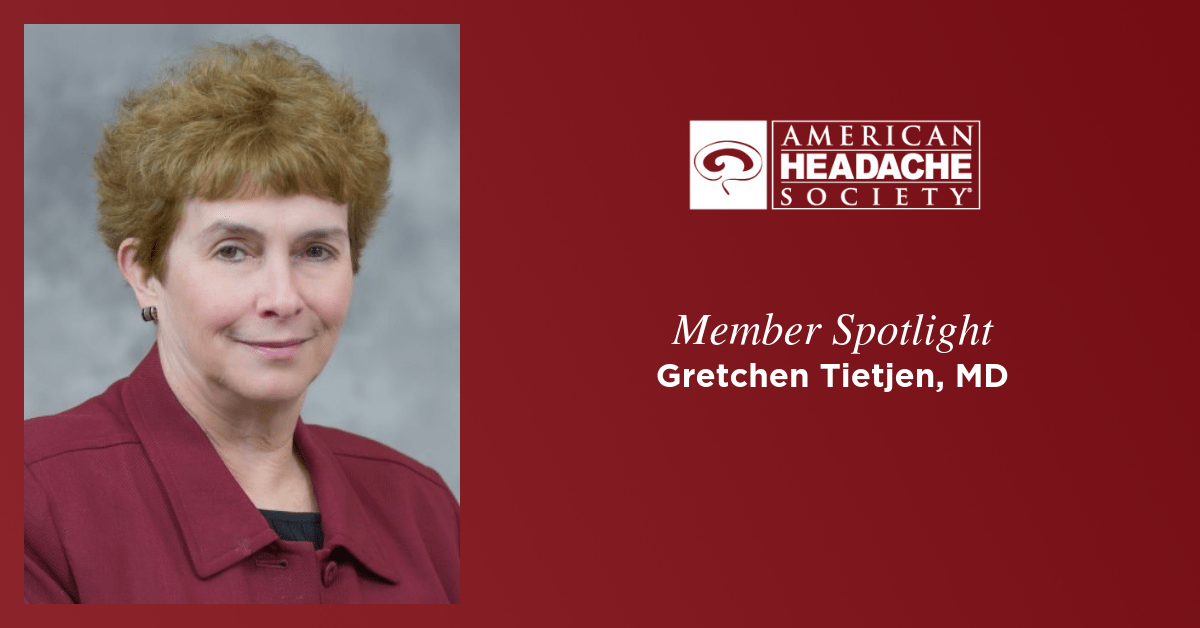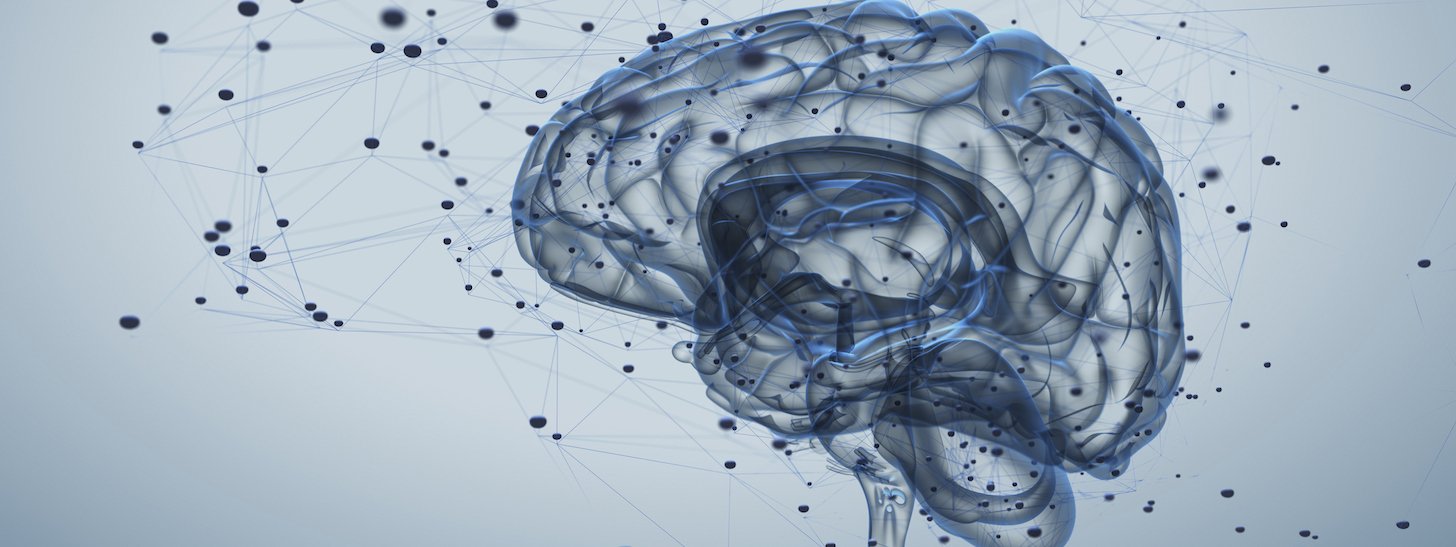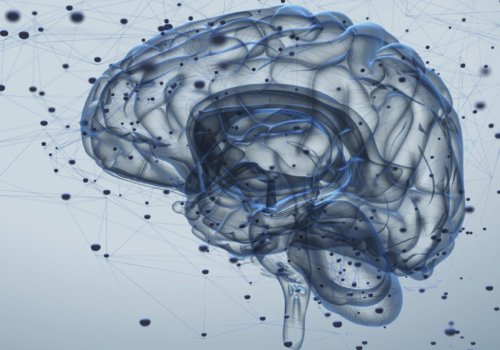
February Member Spotlight: Gretchen Tietjen, MD
Gretchen Tietjen reflects on the Society’s early years and future of headache medicine
This February, we are putting the spotlight on Gretchen Tietjen, MD, a pioneer in the field of headache medicine. She has been a member of AHS for nearly 24 years and served on the Society board from 2002-2008.
Although Tietjen’s fellowship training was in Vascular Neurology, she quickly became interested in the emerging relationship between migraine and stroke. “I have always found migraine pathophysiology and comorbidities fascinating. This spurred my interest and research in the mechanisms of associations of migraine with a variety of conditions including stroke, endometriosis, depression, and early life stress and other social determinants of health,” she says.
Dr. Tietjen went on to serve as Assistant Editor of Cephalalgia for five years, develop an outpatient headache practice, and begin research in the role of biomarkers in the stroke-migraine association, eventually zeroing in on migraine with aura.
She has published several landmark research papers that identified relationships between early life stress, abnormal vascular biomarkers, antiphospholipid antibodies and increased predisposition for migraine or stroke. Her contributions have been instrumental in illuminating the field’s understanding of the pathophysiology of migraine and its association to stroke.
On the current landscape of migraine prevention and treatment, Dr. Tietjen expressed cautious optimism: “Fortunately, there are many new treatments, but these will be best utilized if providers are well educated on indications, risks, benefits, and cost. It is also imperative that providers are educated on how to accurately differentiate migraine from other headache disorders, particularly those associated with high morbidity and mortality.”
She also highlighted the need for greater awareness about the impact of migraine on individuals and shared the satisfaction of helping patients problem-solve for an effective treatment plan.
“Migraine, perhaps because it is so prevalent and usually episodic, is not often recognized by those outside the field for the disability associated with it. I get such satisfaction from helping patients get migraine under control and hearing about the impact this has had on them, their family, and their ability perform well at their job.”
Dr. Tietjen’s expertise within the field of headache disorders covers many areas. She chaired the Society’s Clinical Action Team, which was later renamed Guidelines Committee. In this role, she coordinated the team in addressing chronic opioid use in refractory daily headache, and in writing an AHS position paper on the risk of Serotonin Syndrome with the combined use of triptans and serotonin reuptake inhibitors, at a time when the FDA had come out with an alert on this practice.
Additionally, she belongs to the Women’s Issues section, which was informally organized and functional long before the Society established official sections. Dr. Tietjen fondly recalls one of the earliest meetings at a San Francisco luncheon in the mid-90s, where she debated another doctor on whether it was safe for women with aura to use oral contraceptives. While chair of the section, Dr. Tietjen organized a research consortium that examined the relationship of migraine to a variety of conditions, and to abuse in childhood and adulthood. She has studied numerous topics inspired by her membership within the Women’s Issues section, including medication use during pregnancy and lactation.
Tietjen confessed that identifying and hiring people who have expertise and training in headache medicine has been the toughest part of her responsibilities as Neurology department chair. “There are not enough graduating neurology residents applying for the headache medicine fellowship spots that are available, despite the excellent caliber of these programs.”
While identifying, hiring and training individuals in headache medicine has not been easy, she expressed confidence in the field’s future. “With new drugs and devices on the market and on the horizon, I expect that there’s going to be a lot of interest from many people in the field of neurology to learn more about headache medicine,” says Dr. Tietjen. “They’ll start to find the field a lot more exciting and interesting. They will experience the rewards of knowing how to manage headache and then see success of the treatments.”
Dr. Tietjen is a member of the Women’s Issues section. She is the 2008 recipient of AHS’s Seymour Solomon Award, 2011 Harold G. Wolff Lecture Award and 2017 John R. Graham Award, as well as the 2009 Stroke Innovation Award from the American Heart Association journals.
On behalf of the American Headache Society, we would like to thank Dr. Tietjen for her membership and dedication to the migraine community.
About Gretchen Tietjen
Name: Gretchen Tietjen, MD
AHS Membership: Member since 1995
Primary: Director of the University of Toledo Medical Center’s Headache Treatment and Research Program; Distinguished Professor and Clair Martig Endowed Chair of Neurology at University of Toledo; Member of Women’s Issues Section; Associate Editor of Headache from 2001-2003 and 2007-2018; AHS Board Member from 2002-2008;
Quote: “Migraine is not often recognized by those outside the field for the disability associated with it. I get such satisfaction from helping patients get migraine under control and hearing about the impact this has had on them, their family, and their ability perform well at their job.”
Each month, our Society showcases the accomplishments of one member. Please invest a few minutes to suggest a fellow AHS member to be featured within a future spotlight article via this form.


